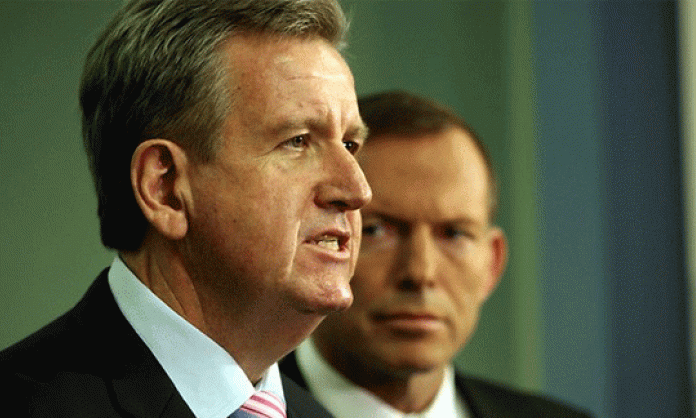Corruption infects almost every aspect of politics. Back scratching, kickbacks, junkets, lavish gifts, et cetera.
It’s a pig’s paradise. Attorney general George Brandis, responsible for drafting the ministerial code of conduct, claimed $1,700 in expenses to attend a mate’s wedding. It was official business, he protested, before paying the money back after it was made public.
Assistant treasurer and Liberal powerbroker Arthur Sinodinos was given a $200,000 per year directorship of Australian Water Holdings prior to his election to the Senate. “It is quite transparent”, says Geoffrey Watson SC, counsel assisting the NSW Independent Commission Against Corruption, “that Mr Sinodinos’s true role in Australian Water Holdings was to open lines of communication with the Liberal Party”.
“No shit, Sherlock”, responds the better part of the population. Sinodinos obtained $3.75 million worth of shares in AWH – an amount reportedly worth up to $20 million had the company secured a major government contract.
Barry O’Farrell reckons he forgot a $3,000 gift bottle of plonk from AWH chief and Liberal Party fundraiser Nick Di Girolamo. It would actually be more damning if he were telling the truth about his “memory failure”. Who lives a life of such extravagance that such a gift – of a value equivalent to that of an amount of food that could sustain a struggling family for a couple of months – is forgettable, little more than chump change?
Meanwhile, the Liberal government’s attack dogs in Fair Work Building and Construction are investigating a CFMEU canteen at Brookfield Multiplex’s Midland Hospital site in Western Australia. The food outlet provides a discount for union members – $2 for a bucket of chips compared with $3.50 for non-members. The Master Builders Association’s Kim Richardson told the West Australian that it could be discrimination. The FWBC is rightly showing “a zero tolerance approach”, he said.
Two buck chips for workers are a cancer waiting to spread, but Grange Hermitage is a benign gesture. O’Farrell resigned, but politicians closed ranks to declare him a man of the utmost integrity. O’Farrell, unlike the unionists, is squeaky clean, lectured the PM to a journalist suggesting otherwise. Maybe he is, judged on such narrow criteria as direct bribery. But who in the real world believes it?
“The Independent Commission Against Corruption’s hearings into AWH have revealed identical political-business models across the party divide”, wrote former federal Labor leader Mark Latham in the Australian Financial Review in April.
“It’s actually a new form of public-private partnership, whereby powerbrokers move seamlessly between party, parliamentary and lobbyist positions. Along the way, they seek to broker lucrative private sector deals and skim money from government agencies …
“For the many Australians concerned about the integrity of our governments, the powerbroker-parliamentary-lobbyist model is Exhibit ‘A’ – compelling evidence of how public office is being used for private gain. Politics has become just another monetarised commodity.”
That’s rich coming from Latham, whose diaries revealed that he was partial to the odd junket or three, along with the associated meals of plump duck and baby potatoes.
Politicians bend to the will of the ultra-rich not primarily because they are bribed, however. They share common interests. Sometimes the politicians simply come from the wealthy elite. You only have to look at Malcolm Turnbull or the former premier of Victoria, Ted Baillieu, who was born into a family of old landowners worth half a billion dollars.
Most politicians are not of that stock, however. They are lawyers, union officials or small business owners. Even though they don’t own large sections of capital, they spend most of their political careers hobnobbing with the people who do. They go to luncheons, hold private meetings and are influenced by the needs of the upper echelons of society.
Once they leave office, they often take up plum jobs with the corporations they have served so well. Think of Martin Ferguson, minister for resources and energy in the last federal Labor government, now chairman of the Australian Petroleum Production and Exploration Association Advisory Board (“the voice of Australia’s oil and gas industry”). Or Steve Bracks becoming an adviser to KPMG after leaving office – the Victorian state government had awarded the company more than 100 contracts over seven years. Bracks reportedly was rewarded up to $100,000 a year for one day per week of service.
In these instances, the interests of individuals in office converge with the interests of the rest of the ruling class. Yet corruption transcends even this type of “transactional influence”.
The power of the ruling class is primarily based on its control of society’s productive or financial apparatus. The primary way a common interest is formed relates to the structure of the system. Corporations seek favourable treatment from governments, but governments rely on the corporations for tax revenues and to provide the economic base on which the state’s own regional or international influence is based.
State and capital, politicians and bosses, bureaucrats and board members – it’s a non-stop tango that is the basis of systematic and structural corruption. Governments, despite being elected by “the people”, govern for the corporate elite. No amount of transparency or personal integrity can change that.








